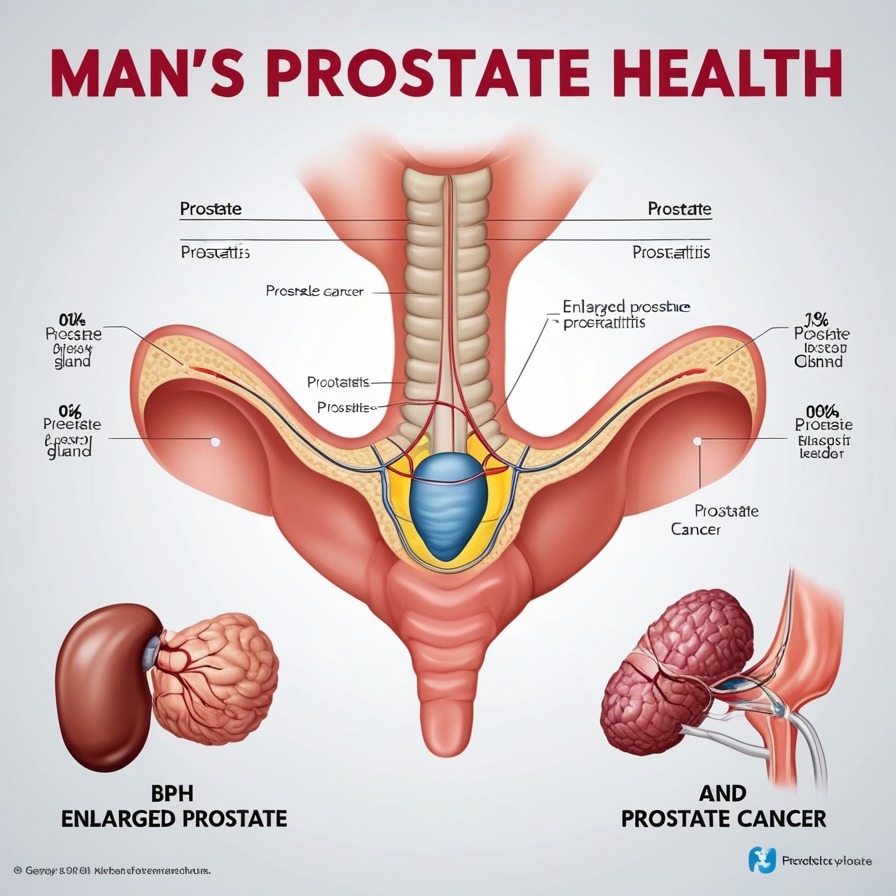Prostate health is a crucial aspect of men’s overall well-being, particularly as they age, the prostate gland is a small, walnut shaped organ located below the bladder and in front of the rectum, Its primary role is to produce seminal fluid, which helps transport and nourish sperm, ensuring good prostate health can help prevent conditions like benign prostatic hyperplasia (BPH) prostatitis, and prostate cancer, this article provides a fact based guide on prostate health, its potential issues, and how to maintain a healthy prostate.
Common Prostate Problems
Benign Prostatic Hyperplasia (BPH)
BPH refers to the non cancerous enlargement of the prostate gland, it is common in older men and is caused by hormonal changes, particularly fluctuations in testosterone and dihydrotestosterone (DHT) symptoms includeFrequent urination, especially at night (nocturia)
Difficulty starting or stopping urination.
Weak urine stream or dribbling.
Prostatitis.
Prostatitis is the inflammation or infection of the prostate gland, it can be acute (sudden onset) or chronic (long term) Symptoms may includePain in the pelvic area, lower back, or genitals.
Painful urination or ejaculation.
Flu like symptoms in cases of bacterial infections.
Prostate Cancer.
Prostate cancer is one of the most common cancers in men worldwide, It often develops slowly and may not show symptoms in its early stages. Advanced symptoms can include:Difficulty urinating or blood in the urine.
Discomfort in the pelvic area.
Bone pain in cases where cancer has spread.
Causes of Prostate Problems
Aging.
The risk of prostate issues, particularly BPH and prostate cancer, increases with age, BPH is most common in men over 50.Hormonal Changes.
Imbalances in testosterone and its derivative, DHT, can lead to prostate enlargement and other problems.Genetics.
A family history of prostate cancer or other prostate conditions can increase your risk.Lifestyle and Diet.
Diets high in saturated fats and low in fruits and vegetables, along with a sedentary lifestyle, can negatively impact prostate health.Infections.
Bacterial infections can cause prostatitis, particularly in men with poor hygiene or untreated urinary tract infections.Ethnicity.
Some ethnic groups are at higher risk, for example, African and Caribbean men are more likely to develop prostate cancer than men from other ethnic backgrounds.
How to Prevent Prostate Problems
While some risk factors like age and genetics cannot be controlled, there are several lifestyle changes and habits that can help reduce the risk of prostate issues.
Maintain a Healthy Diet.
Eat plenty of fruits, vegetables, and whole grains, foods rich in antioxidants, like tomatoes (lycopene) broccoli, and green tea, support prostate health.
Reduce consumption of red meat, processed foods, and high fat dairy products.
Exercise Regularly.
Physical activity improves overall health and reduces inflammation, Aim for at least 30 minutes of moderate exercise most days of the week.
Regular Checkups.
Regular screenings, such as prostate specific antigen (PSA) tests and digital rectal exams (DRE) can help detect problems early.
Men with a family history of prostate issues should begin screening earlier, typically around age 40 or 45.
Stay Hydrated.
Drink plenty of water to promote urinary health and reduce irritation in the urinary tract.
Avoid Smoking and Limit Alcohol.
Smoking and excessive alcohol consumption can increase the risk of prostate cancer and other health problems.
Manage Stress.
Chronic stress can affect hormone levels and contribute to inflammation, practice relaxation techniques like meditation or yoga.
Prevent Infections.
Good hygiene and prompt treatment of urinary tract infections (UTIs) can help prevent prostatitis.
Limit Exposure to Toxins.
Reduce contact with environmental toxins and harmful chemicals that may increase cancer risk.
When to See a Doctor
If you experience any of the following symptoms, consult a healthcare professional immediately.
Difficulty urinating or pain during urination.
Blood in the urine or semen.
Persistent pain in the pelvic or lower back area.
Sudden changes in urinary habits, such as frequent nighttime urination.
Final Thoughts
Prostate health is an essential part of overall men’s health, particularly as they age, by adopting a healthy lifestyle, attending regular checkups, and being mindful of potential symptoms, men can significantly reduce their risk of prostate-related issues early detection and prevention are key to maintaining prostate health and ensuring a better quality of life.

